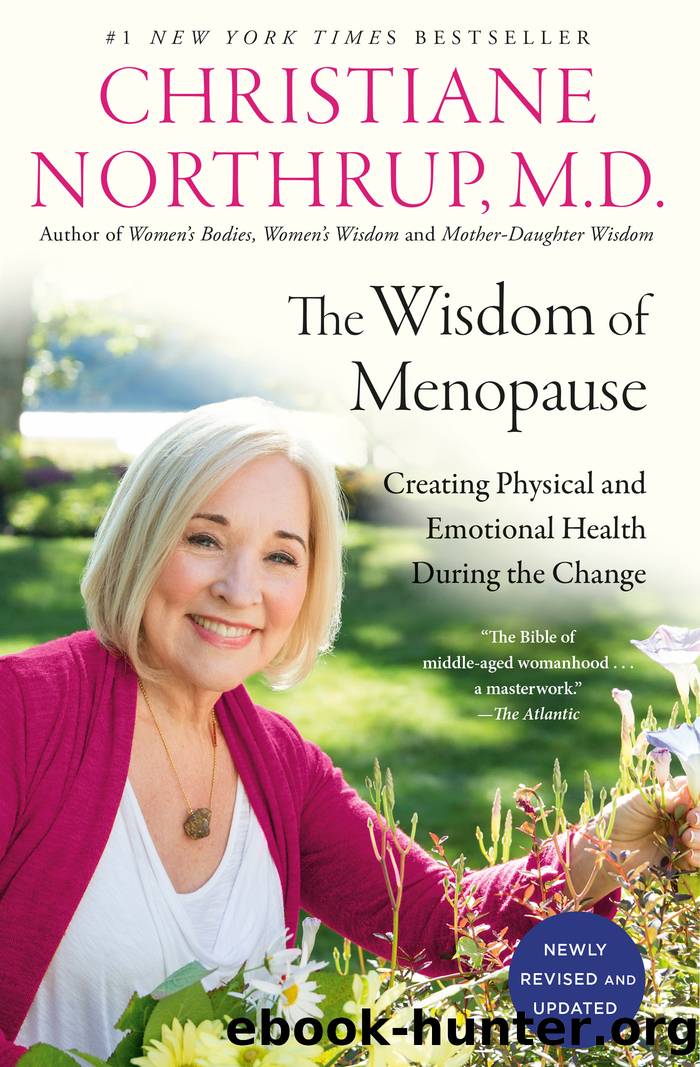The Wisdom of Menopause () by Christiane Northrup

Author:Christiane Northrup [Christiane Northrup]
Language: eng
Format: epub
Publisher: Hay House
Published: 2021-03-27T00:00:00+00:00
Antidepressants Do Not Cure Depression
Antidepressant drugs have long been the first treatment offered for women suffering from depression. One popular category of antidepressants, SSRIs, work in part by increasing the availability of the neurotransmitter serotonin in your brain. Popular examples of these drugs include fluoxetine (Prozac), citalopram (Celexa), escitalopram (Lexapro), paroxetine (Paxil), and sertraline (Zoloft). Another commonly prescribed group of drugs are the tricyclic antidepressants (TCAs), which include imipramine (Tofranil) and amitriptyline (Elavil).
While many have found these drugs might initially be helpful, there is strong reason for caution. First of all, data published in 2009 from the more than 136,000 women in the WHI study indicate that both SSRIs and TCAs have been linked with an increased risk of death, and SSRIs have also been linked to an increased risk of stroke in postmenopausal women.28 Although this risk is indeed small, it may not be a chance you want to take, considering that recent research shows that the benefits of these drugs have been greatly overstated. In a 2008 article published in the New England Journal of Medicine, former FDA psychiatrist Erick H. Turner, M.D., reported that 94 percent of studies showing SSRIs have therapeutic benefits were published, compared to only 14 percent of the studies that showed either no benefits or inconclusive benefits.29 Considering all the medical literature, Dr. Turner determined that SSRIs helped those with severe depression more than those with mild to moderate depressionâbut the bottom line was that in most patients with depression, they were no more effective than a placebo.
A newer study, published in January 2010 in the Journal of the American Medical Association, not only confirmed Dr. Turnerâs findings about SSRIs, but also found that patients with mild to moderate depression received the same amount of relief from TCAs as they did from a placebo.30
You should also know that the side effects of these medications can be quite troublesome. Prozac and other SSRIs can cause nausea, loss of appetite, headache, nervousness, insomnia, restless leg syndrome, and difficulties with libido and sexual dysfunction. The tricyclic antidepressants can cause blurred vision, dizziness, dry mouth, heart rate disturbances, constipation, and difficulties with memory. Those who take these medications often have to try a different drug or dosage level in order to find the one that works best for them.
There are apt to be additional side effects from the long-term use of these drugs. This is certainly true of any drug that alters brain chemistry, and many of the popular psychotropic drugs on the market today are too new for anybody to say with authority that they are safe in the long run. Candace Pert, Ph.D., the scientist who discovered the receptor sites for many important chemicals in the brain associated with mood, commented:
I am alarmed at the monster that Johns Hopkins neuroscientist Solomon Snyder and I created when we discovered the simple binding assay for drug receptors twenty-five years ago. Prozac and other antidepressant serotonin-receptor-active compounds may also cause cardiovascular problems in some susceptible people after long-term use, which has become common practice despite the lack of safety studies.
Download
This site does not store any files on its server. We only index and link to content provided by other sites. Please contact the content providers to delete copyright contents if any and email us, we'll remove relevant links or contents immediately.
The Concise Laws of Human Nature by Robert Greene(1221)
Bioenergetica by Alexander Lowen(1124)
After by Bruce Greyson(925)
The Child in You by Stefanie Stahl(883)
Stress-Proof Your Brain The Yogic Way: Unique Ancient Indian Techniques to End Toxic Stress, Stop Worrying and Inculcate Mental Toughness by Advait(874)
Badass Habits: Cultivate the Awareness, Boundaries, and Daily Upgrades You Need to Make Them Stick by Jen Sincero(789)
Talk of the Ton by unknow(733)
Chakras & Self-Care by Ambi Kavanagh(703)
The Power of Myth by Joseph Campbell & Bill Moyers(675)
Self-Care for Empaths by Tanya Carroll Richardson(636)
Learn To Think Using Thought Experiments by King Patrick(619)
The Mind by E. Bruce Goldstein(613)
No Bad Parts by Richard C. Schwartz(608)
Curative Magic by Rachel Patterson(583)
The Quantum Psychiatrist: From Zero to Zen Using Evidence-Based Solutions Beyond Medication and Therapy by Biswas Dona(551)
The 7 Secrets of Sound Healing Revised Edition by Jonathan Goldman(542)
The Tao of Intimacy and Ecstasy by Solala Towler(536)
Living a Life of Awareness by Don Miguel Ruiz Jr(528)
The Anxiety First Aid Kit by Rick Hanson(525)
